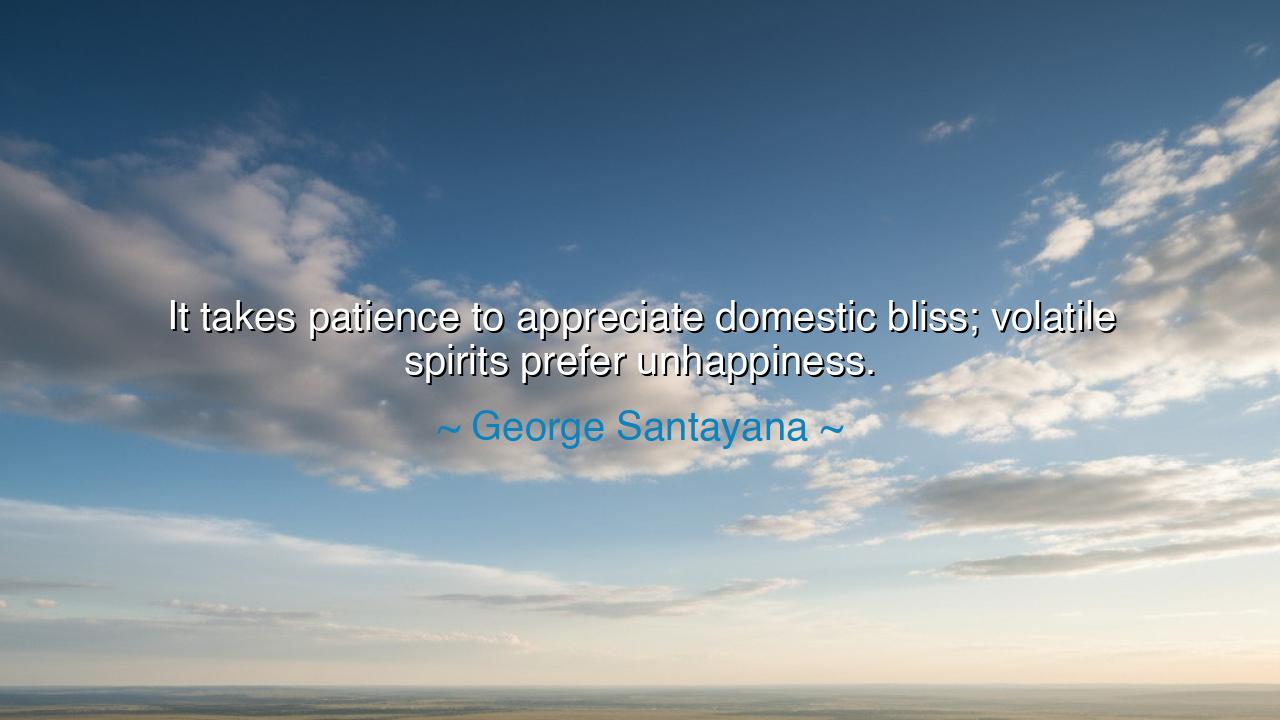
It takes patience to appreciate domestic bliss; volatile spirits






"It takes patience to appreciate domestic bliss; volatile spirits prefer unhappiness." — thus wrote George Santayana, the philosopher-poet who saw life with both intellect and soul. In this single line, he revealed a truth as subtle as it is profound: that peace within the home — the quiet joy of companionship, the rhythm of shared life — is a treasure too delicate for restless hearts. It is not easily won, nor easily kept. It requires patience, that ancient virtue by which love matures, tempers cool, and souls learn to dwell together in harmony. Without it, even the sweetest bonds decay, and those who crave constant passion or conflict will find themselves forever strangers to the gentle happiness of domestic life.
The meaning of Santayana’s words lies in his recognition of the two kinds of spirits that move through the world. The first is the patient soul, who understands that love and peace are not born of perfection, but of endurance — the daily act of choosing kindness over pride, silence over sharpness, forgiveness over fury. Such a soul finds beauty in the ordinary: a shared meal, a familiar voice, the small rituals of care that weave the threads of family and belonging. The second is the volatile spirit, who cannot abide stillness, who seeks excitement even in ruin, who mistakes calm for dullness and argument for depth. To such a one, contentment feels like captivity, and peace, like stagnation. Santayana saw that true domestic bliss — the kind that endures beyond youth and passion — can only be appreciated by those who have learned to be still within themselves.
The origin of this insight springs from Santayana’s broader philosophy, which sought harmony between reason and spirit. Born in Spain and raised amid cultures of refinement and thought, he studied the nature of beauty, morality, and human temperament. He knew that happiness is not an accident, but an art — one that demands discipline of the heart. The home, in his eyes, was a mirror of the soul: if it was in disarray, it reflected inner chaos; if it was peaceful, it reflected wisdom and restraint. Thus, when he wrote that “volatile spirits prefer unhappiness,” he meant that some hearts, untrained in patience, are drawn to turmoil as moths to flame. For the storm, though destructive, gives them the illusion of life — yet it leaves them emptier with every passing gust.
History itself offers proof of this truth. Consider Napoleon Bonaparte, conqueror of nations, whose mind burned too brightly to rest in peace. He could command armies but not quiet his own spirit. His first wife, Josephine, loved him with devotion, yet he cast her aside in his relentless pursuit of glory. Even on the thrones of Europe, he found no rest. His greatness brought him everything except the calm he could not cultivate within. In contrast stands Marcus Aurelius, the philosopher-emperor of Rome, who ruled with patience, governed with restraint, and found contentment in simplicity. He wrote in his Meditations, “Nowhere can man find a quieter or more untroubled retreat than in his own soul.” One lived in the tempest; the other, in tranquility. And when their empires fell, it was not power but serenity that outlived them.
Santayana’s wisdom also speaks to the modern age, where restlessness is worshiped and stillness misunderstood. Many chase novelty, mistaking motion for meaning, forever seeking the next thrill to fill the silence. But domestic bliss — that quiet communion of hearts at peace — asks for a slower rhythm, one that volatile spirits resist. It is a paradox: those who crave happiness most passionately often destroy it with their impatience. They demand that love always shine like fire, never realizing that true warmth glows more softly, like embers that never die.
The lesson of Santayana’s words is therefore clear: learn to cultivate patience, for it is the guardian of peace. If you would find happiness in your home, practice gentleness in speech, humility in quarrel, and constancy in affection. Do not seek perfection in those you love, for love is not a possession to be polished, but a garden to be tended daily with care. Let go of the craving for constant excitement; let peace itself become your passion. For when the heart is calm, even the smallest joys — the sound of laughter, the scent of food, the sight of a loved one’s smile — become holy.
And so, remember this, O seeker of harmony: patience is the price of peace, and peace is the crown of love. Do not envy those whose lives burn brightly with turmoil; their fires consume them. Choose instead the steady light that never flickers — the hearth of understanding, the warmth of forgiveness, the beauty of ordinary days. For in such a home lies the truest form of freedom: the freedom to live without fear, to love without demand, and to rest in the quiet grandeur of a life well-shared.






AAdministratorAdministrator
Welcome, honored guests. Please leave a comment, we will respond soon